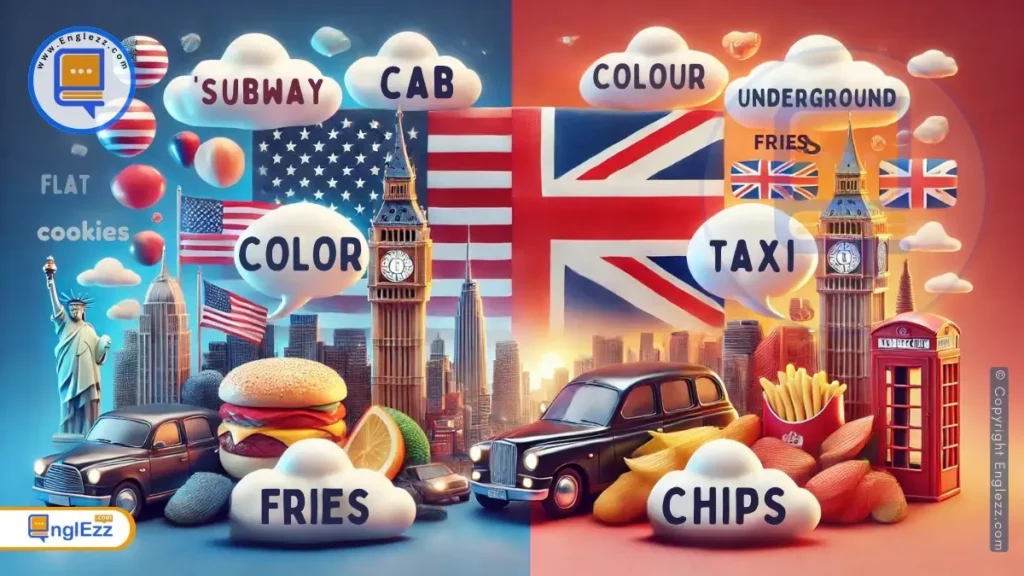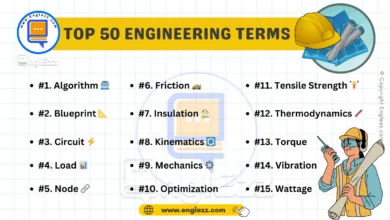English is a rich and diverse language, spoken in many variations around the world. One of the most fascinating aspects of English is how American and British speakers use different words for the same objects or concepts. These variations can be confusing for those learning English or traveling between the US and the UK. In this blog post, we’ll delve into 50 common words that Americans and Brits say differently. Each term will be defined, accompanied by its phonetic transcription, and illustrated with practical examples.
Table of Contents
- 50 Common Words Americans and Brits Say Differently
- #1. Advertisement 📺
- #2. Aluminium 🧪
- #3. Ballet 💃
- #4. Data 💻
- #5. Garage 🚗
- #6. Herbs 🌿
- #7. Lever 🛠️
- #8. Mobile 📱
- #9. Nitrogen 💧
- #10. Opportunity 🌟
- #11. Pronunciation 🗣️
- #12. Queue ⏳
- #13. Routine 🗓️
- #14. Schedule 📅
- #15. Tomato 🍅
- #16. Vase 💐
- #17. Zucchini 🍆
- #18. Herb (US) 🌿
- #19. Aluminium (US) 🧪
- #20. Caramel 🍮
- #21. Baggage 🧳
- #22. Biscuit 🍪
- #23. Cucumber 🥒
- #24. Dance 💃
- #25. Defence 🛡️
- #26. Dustbin 🗑️
- #27. Elevate 🚡
- #28. Favour 🤝
- #29. Football ⚽
- #30. Fortnight 🌙
- #31. Holiday 🌴
- #32. Hospital 🏥
- #33. Jewellery 💍
- #34. Labour 🛠️
- #35. Leaflet 📑
- #36. Lorry 🚚
- #37. Mobile 📱
- #38. Nappy 👶
- #39. Pasta 🍝
- #40. Petrol ⛽
- #41. Postcode 📬
- #42. Rubbish 🗑️
- #43. Sweets 🍬
- #44. Tap 🚰
- #45. Train 🚆
- #46. Trunk 🚗
- #47. Underground 🚇
- #48. Vacuum 🧹
- #49. Zebra 🦓
- #50. Zucchini 🥒
- Words Americans and Brits Say Differently Table
- Conclusion
50 Common Words Americans and Brits Say Differently
Understanding these differences not only enriches your vocabulary but also enhances your comprehension of English in various contexts. Whether you’re a student, traveler, or language enthusiast, this guide will help you navigate the intriguing world of American and British English.

#1. Advertisement 📺
Definition: A public promotion of some product or service.
Phonetic Transcription: /ædˈvɜːrtɪsmənt/ (US) | /ədˈvɜːtɪsmənt/ (UK)
Examples:
- “The advertisement was very catchy.”
- “In the UK, it’s pronounced with a more schwa sound in the middle.”
#2. Aluminium 🧪
Definition: A chemical element with the symbol Al, used in various materials.
Phonetic Transcription: /ˌæljʊˈmɪnəm/ (US) | /ˌæljuˈmɪniəm/ (UK)
Examples:
- “The can is made of aluminium.”
- “In the US, it’s spelled ‘aluminum’ and pronounced differently.”
#3. Ballet 💃
Definition: A type of performance dance.
Phonetic Transcription: /bæˈleɪ/ (US) | /bæˈleɪ/ (UK)
Examples:
- “She performed a beautiful ballet.”
- The pronunciation remains the same, but the emphasis might vary slightly.
#4. Data 💻
Definition: Facts and statistics collected for analysis.
Phonetic Transcription: /ˈdeɪtə/ (US) | /ˈdɑːtə/ (UK)
Examples:
- “The data was analyzed for trends.”
- “In the UK, ‘data’ is pronounced with a broad ‘a’.”
#5. Garage 🚗
Definition: A building for storing vehicles.
Phonetic Transcription: /ɡəˈrɑːʒ/ (US) | /ˈɡærɑːʒ/ (UK)
Examples:
- “The car is parked in the garage.”
- “In the UK, ‘garage’ has a more French-like pronunciation.”
#6. Herbs 🌿
Definition: Plants used for flavoring or medicine.
Phonetic Transcription: /ɜːrbz/ (US) | /hɜːbz/ (UK)
Examples:
- “Add herbs to the recipe for more flavor.”
- “In the UK, ‘herbs’ is pronounced with a clear ‘h’.”
#7. Lever 🛠️
Definition: A rigid bar used to lift or move objects.
Phonetic Transcription: /ˈliːvər/ (US) | /ˈlɛvər/ (UK)
Examples:
- “Use the lever to open the gate.”
- “In the UK, ‘lever’ has a short ‘e’ sound.”
#8. Mobile 📱
Definition: Capable of moving or being moved.
Phonetic Transcription: /ˈmoʊbəl/ (US) | /ˈməʊbaɪl/ (UK)
Examples:
- “She has a new mobile phone.”
- “In the UK, ‘mobile’ is pronounced with a long ‘i’.”
#9. Nitrogen 💧
Definition: A chemical element with the symbol N.
Phonetic Transcription: /ˈnaɪtrədʒən/ (US) | /ˈnaɪtrədʒən/ (UK)
Examples:
- “Nitrogen is a key component of the atmosphere.”
- “The pronunciation remains similar, but accents can vary.”
#10. Opportunity 🌟
Definition: A set of circumstances that makes it possible to do something.
Phonetic Transcription: /ˌɒpəˈtjunɪti/ (US) | /ˌɒpəˈtjuːnɪti/ (UK)
Examples:
- “This is a great opportunity for growth.”
- “In the UK, there’s a slightly longer ‘u’ sound.”
#11. Pronunciation 🗣️
Definition: The way in which a word is pronounced.
Phonetic Transcription: /prəˌnʌnsiˈeɪʃən/ (US) | /prəˌnʌnsiˈeɪʃən/ (UK)
Examples:
- His pronunciation of English is clear.
- “The pronunciation of ‘pronunciation’ remains quite similar.”
#12. Queue ⏳
Definition: A line or sequence of people or vehicles awaiting their turn.
Phonetic Transcription: /kjuː/ (US) | /kjuː/ (UK)
Examples:
- “We had to stand in a queue for tickets.”
- “The pronunciation of ‘queue’ is consistent in both accents.”
#13. Routine 🗓️
Definition: A sequence of actions regularly followed.
Phonetic Transcription: /ruːˈtiːn/ (US) | /rəʊˈtiːn/ (UK)
Examples:
- “Her daily routine includes exercise.”
- “In the UK, ‘routine’ has a diphthong sound in the middle.”
#14. Schedule 📅
Definition: A plan for carrying out a process or procedure.
Phonetic Transcription: /ˈskedʒuːl/ (US) | /ˈʃedjuːl/ (UK)
Examples:
- “Check the schedule for the meeting times.”
- “In the UK, ‘schedule’ starts with a ‘sh’ sound.”
#15. Tomato 🍅
Definition: A red or yellowish fruit with a juicy pulp.
Phonetic Transcription: /təˈmeɪtoʊ/ (US) | /təˈmɑːtəʊ/ (UK)
Examples:
- “I added tomato to the salad.”
- “In the UK, ‘tomato’ is pronounced with a broad ‘a’.”
#16. Vase 💐
Definition: A container used for holding cut flowers.
Phonetic Transcription: /veɪs/ (US) | /vɑːz/ (UK)
Examples:
- “The vase was filled with fresh flowers.”
- “In the UK, ‘vase’ rhymes with ‘jazz.'”
#17. Zucchini 🍆
Definition: A type of summer squash.
Phonetic Transcription: /zʊˈkiːni/ (US) | /zuˈkiːni/ (UK)
Examples:
- “I made a stir-fry with zucchini.”
- “In the UK, it’s pronounced with a slightly different emphasis.”
#18. Herb (US) 🌿
Definition: A plant used for flavoring or medicine.
Phonetic Transcription: /ɜːrb/ (US) | /hɜːb/ (UK)
Examples:
- “Add fresh herb to the dish.”
- “In the UK, ‘herb’ is pronounced with a clear ‘h’.”
#19. Aluminium (US) 🧪
Definition: A chemical element with the symbol Al, used in various materials.
Phonetic Transcription: /ˌæljʊˈmɪnəm/ (US) | /ˌæljuˈmɪniəm/ (UK)
Examples:
- “The can is made of aluminium.”
- “In the US, it’s pronounced differently with a different spelling.”
#20. Caramel 🍮
Definition: A sweet, chewy substance made from sugar.
Phonetic Transcription: /ˈkærəməl/ (US) | /ˈkærəməl/ (UK)
Examples:
- “The pronunciation is similar, but accents may vary.”
- I love caramel sauce on my ice cream.”
#21. Baggage 🧳
Definition: Luggage or suitcases used for travel.
Phonetic Transcription: /ˈbæɡɪdʒ/ (US) | /ˈbæɡɪdʒ/ (UK)
Examples:
- “I need to check my baggage at the counter.”
- “The pronunciation is similar in both accents.”
#22. Biscuit 🍪
Definition: A small baked unleavened cake.
Phonetic Transcription: /ˈbɪskɪt/ (US) | /ˈbɪskɪt/ (UK)
Examples:
- “He had a biscuit with his tea.”
- “In the UK, it refers to what Americans call a cookie.”
#23. Cucumber 🥒
Definition: A green, cylindrical vegetable.
Phonetic Transcription: /ˈkjuːkʌmbər/ (US) | /ˈkjuːkʌmbə/ (UK)
Examples:
- “Add cucumber to the salad.”
- “In the UK, the last syllable is softer.”
#24. Dance 💃
Definition: To move rhythmically to music.
Phonetic Transcription: /dæns/ (US) | /dɑːns/ (UK)
Examples:
- “She loves to dance at parties.”
- “In the UK, ‘dance’ is pronounced with a broad ‘a’.”
#25. Defence 🛡️
Definition: The action of defending from attack.
Phonetic Transcription: /dɪˈfɛns/ (US) | /dɪˈfɛns/ (UK)
Examples:
- “The team played strong defence in the game.”
- “The pronunciation is the same, but spelling differs.”
#26. Dustbin 🗑️
Definition: A container for household waste.
Phonetic Transcription: /ˈdʌstbɪn/ (US) | /ˈdʌstbɪn/ (UK)
Examples:
- “Throw the trash in the dustbin.”
- “The pronunciation remains consistent.”
#27. Elevate 🚡
Definition: To lift or raise something.
Phonetic Transcription: /ˈɛlɪˌveɪt/ (US) | /ˈɛlɪˌveɪt/ (UK)
Examples:
- “The platform was elevated for better views.”
- “The pronunciation is generally the same.”
#28. Favour 🤝
Definition: An act of kindness or support.
Phonetic Transcription: /ˈfeɪvər/ (US) | /ˈfeɪvə/ (UK)
Examples:
- “Could you do me a favour?”
- “In the UK, ‘favour’ has a softer ending.”
#29. Football ⚽
Definition: A game played with a round ball on a field.
Phonetic Transcription: /ˈfʊtbɔːl/ (US) | /ˈfʊtbɔːl/ (UK)
Examples:
- “He enjoys watching football matches.”
- “In the US, it’s known as ‘soccer,’ while ‘football’ is used in the UK.”
#30. Fortnight 🌙
Definition: A period of two weeks.
Phonetic Transcription: /ˈfɔːrtnaɪt/ (US) | /ˈfɔːtnaɪt/ (UK)
Examples:
- “We’ll see you in a fortnight.”
- “In the US, this term is less commonly used.”
#31. Holiday 🌴
Definition: A period of time spent away from home or work.
Phonetic Transcription: /ˈhɑːləˌdeɪ/ (US) | /ˈhɒlədeɪ/ (UK)
Examples:
- “We’re going on holiday next month.”
- “In the UK, ‘holiday’ refers to vacations, while in the US, it can mean public holidays.”
#32. Hospital 🏥
Definition: A medical facility for treatment.
Phonetic Transcription: /ˈhɑːspɪtl/ (US) | /ˈhɒspɪtl/ (UK)
Examples:
- “She was admitted to the hospital yesterday.”
- “The pronunciation is slightly different, with a softer ‘o’ in the UK.”
#33. Jewellery 💍
Definition: Objects worn for personal adornment.
Phonetic Transcription: /ˈdʒuːwəlri/ (US) | /ˈdʒuːəlri/ (UK)
Examples:
- “She wore beautiful jewellery to the event.”
- “In the US, it’s spelled ‘jewelry’ and pronounced differently.”
#34. Labour 🛠️
Definition: Work, especially physical work.
Phonetic Transcription: /ˈleɪbər/ (US) | /ˈleɪbə/ (UK)
Examples:
- “The labour was intensive but necessary.”
- “In the UK, ‘labour’ has a more muted ending.”
#35. Leaflet 📑
Definition: A small book or pamphlet containing information.
Phonetic Transcription: /ˈliːflɪt/ (US) | /ˈliːflɪt/ (UK)
Examples:
- “She handed out leaflets for the event.”
- “The pronunciation remains consistent in both accents.”
#36. Lorry 🚚
Definition: A large vehicle for transporting goods.
Phonetic Transcription: /ˈlɔːri/ (US) | /ˈlɒri/ (UK)
Examples:
- “The lorry was full of packages.”
- “In the US, this is known as a ‘truck.'”
#37. Mobile 📱
Definition: Capable of moving or being moved.
Phonetic Transcription: /ˈmoʊbəl/ (US) | /ˈməʊbaɪl/ (UK)
Examples:
- “She has a new mobile phone.”
- “In the UK, ‘mobile’ is pronounced with a long ‘i.'”
#38. Nappy 👶
Definition: A garment for a baby to absorb waste.
Phonetic Transcription: /ˈnæpi/ (US) | /ˈnæpi/ (UK)
Examples:
- “Change the baby’s nappy regularly.”
- “In the US, it’s known as a ‘diaper.'”
#39. Pasta 🍝
Definition: A type of Italian food made from wheat.
Phonetic Transcription: /ˈpæstə/ (US) | /ˈpɑːstə/ (UK)
Examples:
- “We had spaghetti pasta for dinner.”
- “In the UK, ‘pasta’ is pronounced with a broad ‘a.'”
#40. Petrol ⛽
Definition: Fuel used in vehicles.
Phonetic Transcription: /ˈpɛtrəl/ (US) | /ˈpɛtrəl/ (UK)
Examples:
- “We need to fill up the car with petrol.”
- “In the US, this is referred to as ‘gasoline.'”
#41. Postcode 📬
Definition: A series of letters and numbers used for mail sorting.
Phonetic Transcription: /ˈpoʊstkoʊd/ (US) | /ˈpəʊstkəʊd/ (UK)
Examples:
- “Please provide your postcode for delivery.”
- “In the US, it’s known as a ‘ZIP code.'”
#42. Rubbish 🗑️
Definition: Waste material; garbage.
Phonetic Transcription: /ˈrʌbɪʃ/ (US) | /ˈrʌbɪʃ/ (UK)
Examples:
- “Dispose of the rubbish properly.”
- “In the US, the term ‘rubbish’ is often replaced by ‘garbage.'”
#43. Sweets 🍬
Definition: Confectionery or candies.
Phonetic Transcription: /swiːts/ (US) | /swiːts/ (UK)
Examples:
- “The kids enjoyed the sweets at the party.”
- “In the US, ‘sweets’ is used, but ‘candies’ is more common.”
#44. Tap 🚰
Definition: A device for controlling the flow of liquid.
Phonetic Transcription: /tæp/ (US) | /tæp/ (UK)
Examples:
- “Turn on the tap to get some water.”
- “The pronunciation is consistent across accents.”
#45. Train 🚆
Definition: A series of connected vehicles that travel on tracks.
Phonetic Transcription: /treɪn/ (US) | /treɪn/ (UK)
Examples:
- “We took the train to London.”
- “The pronunciation remains the same.”
#46. Trunk 🚗
Definition: The main storage compartment of a car.
Phonetic Transcription: /trʌŋk/ (US) | /trʌŋk/ (UK)
Examples:
- “The trunk was packed for the trip.”
- “In the UK, this is known as the ‘boot.'”
#47. Underground 🚇
Definition: A subway or metro system.
Phonetic Transcription: /ˌʌndərˈɡraʊnd/ (US) | /ˌʌndəˈɡraʊnd/ (UK)
Examples:
- “We took the Underground to get around the city.”
- “In the US, it’s often referred to as the ‘subway.'”
#48. Vacuum 🧹
Definition: A device used to clean floors by suction.
Phonetic Transcription: /ˈvækjuːm/ (US) | /ˈvækjuːm/ (UK)
Examples:
- “I need to vacuum the living room.”
- “The pronunciation is similar in both accents.”
#49. Zebra 🦓
Definition: A large wild animal with black and white stripes.
Phonetic Transcription: /ˈziːbrə/ (US) | /ˈzɛbrə/ (UK)
Examples:
- “We saw a zebra at the zoo.”
- “In the UK, the ‘e’ is pronounced differently.”
#50. Zucchini 🥒
Definition: A green summer squash.
Phonetic Transcription: /zʊˈkiːni/ (US) | /zuˈkiːni/ (UK)
Examples:
- “Add some zucchini to the recipe.”
- “In the UK, it is pronounced with a soft ‘u.'”
Words Americans and Brits Say Differently Table
| #1. Aluminum 🏗️ | #11. Lift 🚡 | #21. Biscuit 🍪 |
| #2. Ankle 📏 | #12. Lorry 🚚 | #22. Cucumber 🥒 |
| #3. Apartment 🏢 | #13. Luggage 🧳 | #23. Dance 💃 |
| #4. Attorney 👔 | #14. Nappy 👶 | #24. Elevator 🚠 |
| #5. Band-Aid 🩹 | #15. Petrol ⛽ | #25. Football ⚽ |
| #6. Barbecue 🍖 | #16. Plaster 🩹 | #26. Postcode 📬 |
| #7. Faucet 🚰 | #17. Rubbish 🗑️ | #27. Schedule 📅 |
| #8. Flashlight 🔦 | #18. Sweets 🍬 | #28. Torch 🔦 |
| #9. Garbage 🗑️ | #19. Tap 🚰 | #29. Trunk 🚗 |
| #10. Hood 🚗 | #20. Vacation 🌴 | #30. Zebra 🦓 |
Conclusion
The English language is full of nuances and regional variations that make it both challenging and intriguing. By familiarizing yourself with these 42 differences between American and British English, you’ll gain a deeper appreciation for the language and its diverse usages.
This knowledge is invaluable for clear communication and cultural understanding, whether you’re writing, speaking, or simply engaging with English media.
We hope this guide has provided you with useful insights and practical examples to bridge the gap between American and British English.
For more tips and updates on language learning, follow @EnglEzz on social media and stay tuned for more enlightening content.









Discover how pronunciation can change the way you understand English! From “aluminum” to “zebra,” explore 50 words with unique American and British pronunciations. Dive into our detailed guide and see how these variations can enrich your English skills.
For more language tips and updates, don’t forget to follow and like @EnglEzz!
https://www.englezz.com/words-americans-and-brits-say-differently/
#EnglEzz, #vocabulary, #linguistics, #learnenglish, #EnglishTips, #Pronunciation, #LanguageLearning, #CulturalDifferences, #AccentTraining